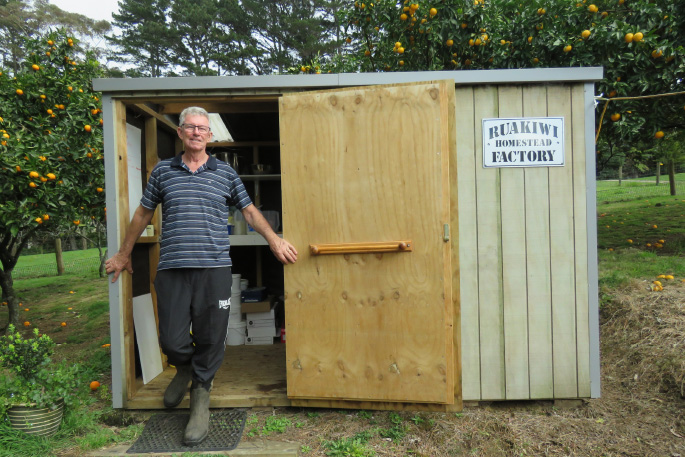Like a ponga fern, Phil Parker’s driveway off Wharawhara Rd slowly unfurls opening a glade behind a tree-lined boundary and your eyes to a relaxed country lifestyle within.
Hanging from lines of trees bright yellow citrus fruit greets you before an expansive duplex-style home, a lawn of green grass with South Devon stock behind a wire, then the chickens, ducks and vegetable gardens beyond.
When Phil is not tending to the needs of plants and animals, he can be found in the small Ruakiwi Homestead factory – a tiny cottage shed – making natural soaps.
“We came here five years ago after living in Taupo 30-odd years. We had a lifestyle block there and I worked for Taupo District Council as emergency manager and principal rural fire officer.”
But when it came time to retire, Taupo was too cold for what Phil and his wife Carole wanted to do. “We wanted to be more self-sufficient.”
One weekend in the Western Bay of Plenty they came across the Katikati property and thought: ‘Yes, this will do’. “There were no buildings on it and the place was rundown. There were trees everywhere. It took us a good 12 months to get it into shape.”
Citrus goodness
The land did however have lemonade, grapefruit and orange and a few plum trees. About half were kept, and Phil has added pears, apples, peaches, a few more plums, grapes and passionfruit.
“We wanted a variety of fruit we could eat ourselves but I also sell some at the local markets.”
What about the soap-making? Three years ago Phil had got to the stage where he’d cleaned up the property and thought: ‘What am I going to do now?’
“On the internet I found goat’s milk soap and thought that was interesting. I did some research and it looked fun. Originally, I was only going to make it for ourselves. I got hold of some people with goats at Te Aroha who sold me some goat’s milk and I made the first batch from a recipe I found online.
“Our family and friends liked it so I built a shed that we’ve set up as my little factory and got into it.
“Then it got to the stage where I went to the local markets with four types of soaps. They just went gangbusters and people started asking me for different types of soap. So I created more – it’s just gone crazy. Now I also produce Manuka honey and oil soap for an iwi honey-producing organisation. I make the soap, they buy it and market it themselves.”
Phil only uses natural oils in his soaps, which now come in liquid form too. “I get my olive oil directly from a Hastings factory. All my products are food grade – they contain olive oil, coconut oil, lard and I use essential oils, such as lavender and tea tree. I don’t use fragrance oils or chemicals. And that is really all there is to it.”
A batch of 14 takes one hour to make, then Phil lets it cure for six weeks. “The harder you let the soap get, the longer the bar will last. For the average person, a soap bar will last about one month in the shower.”
Phil says people love the soaps because goat’s milk is really good for skin conditions. “If people have eczema or psoriasis – it is really good for these.”
Soaps and caretaking
A friend in Taupo had a young girl with bad eczema. Phil sent her a bar of tea tree soap. “The girl wouldn’t go to school without sleeves because she was so embarrassed about it. She tried it and within a week, it started to clear up. Within a fortnight, it had gone.”
The all-natural ingredients is also a huge drawcard for those striving to use products in which they know the ingredients – today a worldwide trend. “We also use natural packaging; just brown paper and a stamp. No printing etc.”
And with the soaps a side-hussle, Phil still has time to be caretaker of the property – where he lives with wife Carole in one side of the duplex, while their daughter Lee, son-in-law Logan and two teenage granddaughters Dakota and Tagan reside in the other.
The family grow their own potatoes, which keep them fed for six-odd months; vegetables from seed both outside and in an ingenious tin and clearlite home-made hothouse during winter, the fruit trees, and they eat their own meat, and eggs from the chooks and ducks.
“We haven’t bought meat for years. We also sell eggs at the gate when we have surplus.” Phil has a huge lone banana tree that produces bunches of the fruit all at once, which he freezes for baking, smoothies etc. And there are beehives on-site for pollination and honey.
And annually he receives a delivery of newborn lambs, which he rears for two weeks before selling on. So what’s behind the soap’s name Ruakiwi Homestead? “With most of my background being farming, one beef block I managed was called ‘Ruakiwi’. Plus, ‘Ruakiwi’ means to two kiwis – well, we have two Kiwi families living here, so it made sense,” says Phil, who enjoys his piece of paradise – caretaker role and all. “It’s worked out well; we love it here.”



0 Comments
Leave a Comment